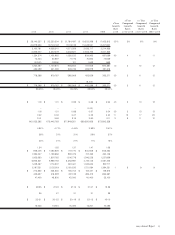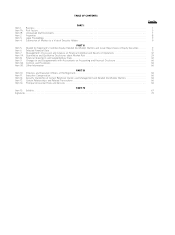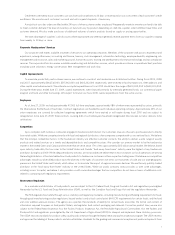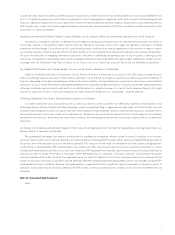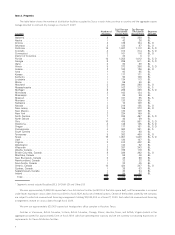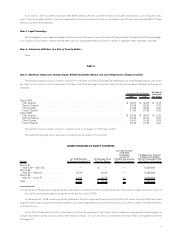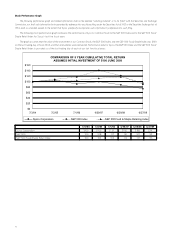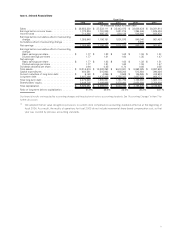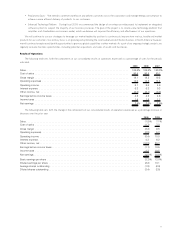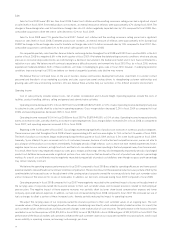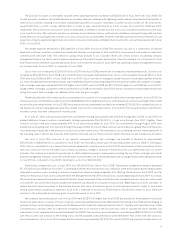Sysco 2009 Annual Report Download - page 26
Download and view the complete annual report
Please find page 26 of the 2009 Sysco annual report below. You can navigate through the pages in the report by either clicking on the pages listed below, or by using the keyword search tool below to find specific information within the annual report.Failure to Successfully Renegotiate Union Contracts Could Result in Work Stoppages
As of June 27, 2009, approximately 8,400 employees at 54 operating companies were members of 57 different local unions associated with
the International Brotherhood of Teamsters and other labor organizations. In fiscal 2010, 15 agreements covering approximately 1,900 employees
have expired or will expire. Since June 27, 2009, three contracts covering 440 of the 1,900 employees have been renegotiated. Failure of our
operating companies to effectively renegotiate these contracts could result in work stoppages. Although our operating subsidiaries have not
experienced any significant labor disputes or work stoppages to date, and we believe they have satisfactory relationships with their unions, a work
stoppage due to failure of multiple operating subsidiaries to renegotiate union contracts could have a material adverse effect on us.
A Shortage of Qualified Labor Could Negatively Impact our Business and Materially Reduce Earnings
Our operations rely heavily on our employees, particularly drivers, and any shortage of qualified labor could significantly affect our business. Our
recruiting and retention efforts and efforts to increase productivity gains may not be successful and there may be a shortage of qualified drivers in
future periods. Any such shortage would decrease Sysco’s ability to effectively serve our customers. Such a shortage would also likely lead to higher
wages for employees and a corresponding reduction in our net earnings.
Our Funding Obligations with Respect to our Company-Sponsored Qualified Pension Plan may Increase Should Financial Markets Experience Further
Declines
Our company-sponsored qualified pension plan (Retirement Plan) holds investments in both equity and fixed income securities. The amount of
our annual contribution to the plan is dependent upon, among other things, the returns on the plan’s assets and discount rates used to calculate the
plan’s liability. As a result of the decline in the financial markets in fiscal 2009, the value of the investments held by the Retirement Plan declined
through June 27, 2009 as compared to June 28, 2008. These fluctuations in asset values have caused anticipated future contributions to the plan to
increase, have caused pension expense for fiscal 2010 to increase and have resulted in a reduction in our shareholders’ equity as of June 27, 2009,
which is when this plan’s funded status was last measured. Also, the projected liability of the plan will be impacted by the fluctuations of interest
rates on high quality bonds in the public markets. Specifically, decreases in these interest rates may have an adverse impact on our results of
operations. To the extent financial markets experience further declines, our future contributions, pension expense and funded status may be
negatively affected for future years which could have an adverse impact on our liquidity and results of operations.
We may be Required to Pay Material Amounts Under Multi-Employer Defined Benefit Pension Plans
We contribute to several multi-employer defined benefit pension plans based on obligations arising under collective bargaining agreements
covering union-represented employees. Approximately 12% of our current employees are participants in such multi-employer plans. In fiscal 2009,
our total contributions to these plans, which include payments for voluntary withdrawals, were approximately $47,982,000.
We do not directly manage these multi-employer plans, which are generally managed by boards of trustees, half of whom are appointed by the
unions and the other half by other contributing employers to the plan. Based upon the information available to us from plan administrators, we
believe that several of these multi-employer plans are underfunded. In addition, the Pension Protection Act, enacted in August 2006, requires
underfunded pension plans to improve their funding ratios within prescribed intervals based on the level of their underfunding. As a result, we expect
our required contributions to these plans to increase in the future.
Under current law regarding multi-employer defined benefit plans, a plan’s termination, our voluntary withdrawal, or the mass withdrawal of all
contributing employers from any underfunded multi-employer defined benefit plan would require us to make payments to the plan for our
proportionate share of the multi-employer plan’s unfunded vested liabilities. Based on the information currently available from plan administrators,
we estimate that our share of the aggregate withdrawal liability on most of the multi-employer plans we participate in, some of which appear to be
underfunded, could be as much as $80,000,000 as of June 27, 2009 based on a voluntary withdrawal. Because the company is not provided with
the information by plan administrators on a timely basis and the company expects that many multi-employer pension plans’ assets have declined
due to recent financial market performance, we believe our share of the withdrawal liability could be greater. In addition, if a multi-employer defined
benefit plan fails to satisfy certain minimum funding requirements, the Internal Revenue Service (IRS} may impose a nondeductible excise tax of 5%
on the amount of the accumulated funding deficiency for those employers contributing to the fund. As of June 27, 2009, we had approximately
$17,000,000 in liabilities recorded in total related to certain multi-employer defined benefit plans for which our voluntary withdrawal has already
occurred, all of which are expected to be paid during fiscal 2010. Requirements to pay such increased contributions, withdrawal liability, and excise
taxes could negatively impact our liquidity and results of operations.
Product Cost Deflation May Adversely Impact Future Operations
Our business may be adversely impacted by periods of prolonged product cost deflation. We make a significant portion of our sales at prices
that are based on the cost of products we sell plus a percentage markup. As a result, our profit levels may be negatively impacted during periods of
product cost deflation, even though our gross profit percentage may remain relatively constant.
We Must Finance and Integrate Acquired Businesses Effectively
Historically, a portion of our growth has come through acquisitions. If we are unable to integrate acquired businesses successfully or realize
anticipated economic, operational and other benefits and synergies in a timely manner, our earnings per share may decrease. Integration of an
6



